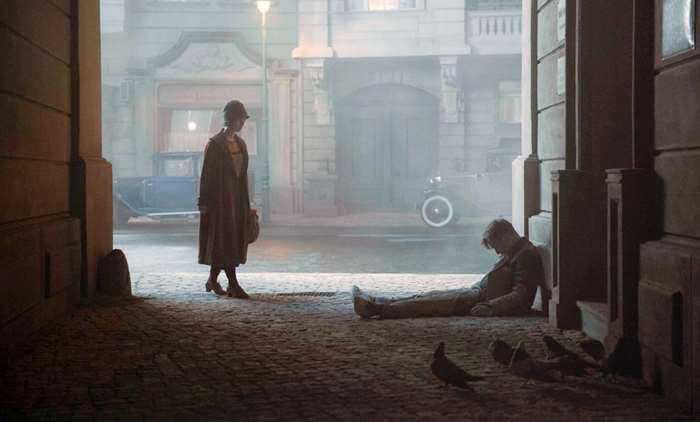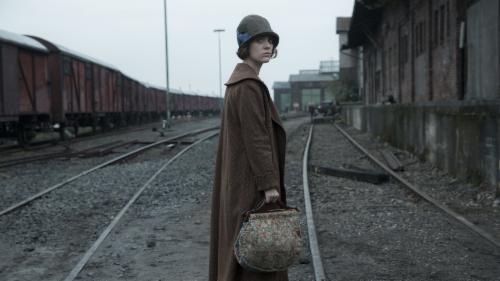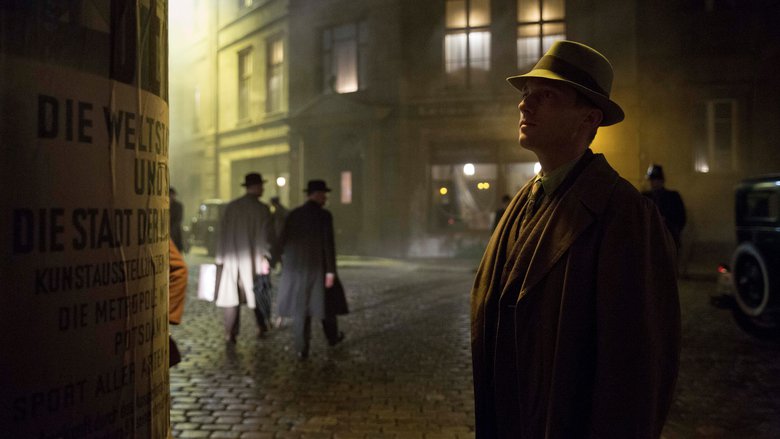Babylon Berlin: "Episode 7" and "Episode 8" (with Allison Keene)
In which season one draws to a close on an incredibly odd cliffhanger

(For the foreseeable future — aka as long as this quarantine lasts — Emily will be watching the critically acclaimed German drama Babylon Berlin, a neo-noir set in 1929 Germany. The series is available on Netflix in the United States. For every installment, she will be joined by a special guest. Today’s guest is Paste’s TV editor, Allison Keene. Find Allison on the internet at Paste and on Twitter.)

Emily: The first-season finale of Babylon Berlin is an odd thing. Because the team involved shot seasons one and two in one big chunk, they had to come up with a season one ending that could serve, simultaneously, as a season finale and a midseason finale. Some countries would see this as the end of season one; others would see it as the midpoint. (The U.S. split the difference — Netflix lists this as the end of season one, but it also uploaded both of the first two seasons on the same day.)
I would say the team behind the show did more or less as well as it possibly could have, but constructing such a finale is still a task that does not naturally suggest tremendous television. (It’s also worth noting that the team had to face this same challenge when it came to the episodes themselves, since many countries aired two episodes every week, which is why we’re covering episodes two at a time in this newsletter.) I liked “Episode 8” a lot, until it came to a cliffhanger that feels as if it will be erased within five minutes. I know how television works. I know Gereon and Lotte are going to be working together — and presumably kissing — for years to come.
But as far as the rest of “Episode 7” and “Episode 8” goes, I liked these the most of any episodes since the first two. They bring the action of season one to a lively close, and they feature several stunning sequences that begin to ramp up the series’ connections to the dark historical period the characters are about to enter. Also, there’s a rousing gun battle, and we get to the roots of Gereon’s trauma!
Allison, you watched this series entirely after I asked you if you wanted to do a recap with me, so I’m interested to hear what you think of it more broadly but also these two episodes specifically.
Allison: Firstly, thank you for getting me to watch this series that is very much Rated A for Allison.
Foreign historical cop drama set in the 1920s?? I tell you … it hits every interest. I’ve loved the binge-watch, which was not nearly as heavy as I was expecting. There is such a sly humor to Babylon Berlin, both within the narrative as well as its meta-awareness of noir and expressionist styling. Also, there is an overwhelmingly amount of male nudity which, as Libby brought up in the recaps of Episodes 1 and 2, is a major step in terms of gender equality onscreen. Leave it to the Germans!
There’s a lot(te) I want to dive into with these kinda-finale episodes—including but not limited to Alfred Nyssan’s casual cravats (or are they scarves?) and the roguish handsomeness of The Armenian, a.k.a. Edgar Kasabian—but first I want to talk about the lightest of all of the storylines, which is Greta’s Day Out! I only want the best for Greta, and not only did she get a break from the demanding Frau, but she got to share Secret Sausage (in the most pious possible way) with her employer after a wonderful day in a borrowed dress. Truly, the dream.
That’s something I think the show has done really well; while there is a lot of darkness (this is a troubled time in post-war Germany, and our leads deal with a huge amount of personal hardships), it relieves that heaviness with moments of joy, however fleeting (like Gereon’s roll in the hay with his landlady). What so many self-styled “serious” dramas often forget is to let some light in. It helps us connect with these characters more fully, making them more human, and I can honestly say that I’m truly invested in everything happened to Gereon, Lotte, and Greta—causing no small amount of anxiety in these episodes in particular (oh, and our “harder to kill than Rasputin” comrade Alexei Kardakov).
Speaking of Kardakov, did the communist storyline redeem itself for you? I was always interested in it, but it felt like quite a bit paid off here with Lotte’s investigation. I mean, it’s Gereon and Lotte’s world and we’re just living in it. But as a member of the “juicy press” ….

Emily: Yes! It was worth it for that scene where Lotte and Stefan find their way to the print shop and figure out that there was a car of poison gas headed for Istanbul — except they have no idea it was actually a car of gold headed there, because Sveta’s label switching on those trains has unraveled the show’s political world completely. It’s thrown everybody off the scent of the Trotskyists (who are likely all dead, because we haven’t seen Alexei in a bit) and right after the Black Reichswehr members.
The sequence where Gereon finds himself at a meeting of those Black Reichswehr members, as they remember the Germans who fell from their platoon in World War I, is truly eerie, and I loved how it was intercut with Gereon’s memories of the time he couldn’t save his brother. And also a horse in a gas mask? There is a cataclysmic quality to this show — a sense of living right on the edge of oblivion — that’s really speaking to me in this moment in history.
Another thing I thought was bold was how long it takes the finale to circle back to Gereon and Lotte, our ostensible protagonists. About half the running time is spent on Greta’s day out, as well as tidying up the story of Nyssen, and then we’re right back with Gereon as he tries to close the case of the compromising films, then has no stomach for what he finds. (It’s also clear by now that Bruno is a total shithead, right?) And Lotte doesn’t turn up until the final handful of minutes, when she has to be there to facilitate that weird cliffhanger.
Two sequences I really liked in these episodes that haven’t been mentioned yet — first, Benda playing the piano as we elegantly cut between all of the characters at the end of “Episode 7.” This is a more conventional musical montage than the other musical moments in the series, but in the way it suggests little connections between these folks that they might not even be aware of, it reminded me of my beloved Deadwood.
The other sequence is Bruno and Gereon burning the films, rather than doing anything with them. It’s such a noir idea — the powerful will never let anything happen because of these films, so the only solution is to make it seem as though they never existed. The image of the two men standing over the fire feels like the show’s ideas in a nutshell.
How are you feeling about the story’s sweep, Allison? You mentioned being all in on Geron, Lotte, and Greta, but this show has a lot of characters!
Allison: I will — and I cannot overstate this enough — never get used to seeing a horse in a gas mask. What an image. Yucatan! He comes up so often (if that was him on the battlefield). He’s the “Rosebud” of this story, I am convinced.
But yes, I’m really glad that we got more information on Gereon’s backstory with his brother (who, just for a moment, I thought he was going to leave for dead). I’m also glad you brought up the Black Reichswehr, because that scene, for me, marked the first overt signals of Germanic pride resurfacing, with overtones of Hitler youth. Chilling.
I also found it odd that we didn’t spend much time with Lotte in this finale-that-wasn’t-a-finale-but-also-was, although I suppose the investigative side of her story is somewhat on pause until the next chapter of Gereon’s. (Speaking of which, wow there was a lot of explicit vintage porn in this, wasn’t there? They really went for it in “Episode 8.” Again I say: Leave it to the Germans!)
And yes, this show does have a lot of characters, all of whom are great in their own ways. I love the organic connections among them, and I’m so intrigued in particular by Svetlana, who seems like the key to a lot of it. She appears to have puts her cards all out on the table now with the two men closest to her, but since she’s always so many steps ahead it must be part of another stratagem. There’s also her whole connection to the Berlin underground scene where she is a male singer. And a really dashing one at that! (Something about her costume really makes me think of an anime, maybe Cowboy Bebop?) (Hey, that’s the next show I’m covering — Em.)
I’m really enjoying the interplay of all of these various elements — politics! the police! melodrama! — and that they never feel forced or overwrought. It’s a smart show, and I’ll admit a lot of times I have no idea what’s going on politically (I have paused and gone to Wiki more than once because of my historical ignorance), and I like that it doesn’t explain everything right away or even make things simple.
Speaking of the show’s many great characters, let’s talk about the budding psychological practices that really bookended this first set of episodes. I love crusading doctor characters, and Babylon Berlin has two! In addition to “Mrs. Stalin,” (bless her), we also have Dr. Anno Schmidt who is trying to treat PTSD symptoms with hypnosis and Rorschach tests, all of which his colleagues pooh-pooh, calling him a fraud. I’m not quite sure though if he’s a friend or foe at this point, given his connection with The Armenian. But I do very much like that the series puts Gereon’s own anxiety and breakdowns at the forefront. Some of those sequences are just peak German Expressionism.
Oh yeah, and Bruno is a total shit! I was almost made ill when he so casually reveals Lotte’s betrayal of Gereon. I hope she can add some context to that soon because my heart! The burning of the film and the close of that storyline did help these episodes feel like the conclusion of something, or at least, that there was a new chapter about to start. But how did you feel about that final reveal of Helga, where she stares right into our soul?

Emily: I’ll admit that Helga is one of those elements of the show that I’m not really vibing on just yet. It feels like she’s there to offer Gereon some added tragedy. I don’t mind it in the abstract, but there’s so much weight placed on a character we’ve barely met. At least getting to see Gereon’s ultimate separation from his brother gives that storyline some weight.
What Babylon Berlin is really great at is showing the ways that the modern intrudes on the past. Like we know that PTSD is a thing, but when Dr. Schmidt gives his presentation, he’s jeered at by men who don’t want to believe that this could have happened to any soldier. It’s so important to them to believe that the German Army cannot fail its soldiers and, instead, can only be failed by those solders that they’re willing to toss those soldiers into jail cells and gutters. Sound like any country you know????
(Trans sidebar: Gereon’s desperate attempts to fit in with the other guys and disguise his debilitating mental condition have big “Emily tries not to admit she has gender dysphoria” energy, which may be why I like the dude so much.)
But there are other areas of the show in which that divide between what we know of the characters in 1929 and what we know of the world to come drive much of the show’s conflict, and they’re so haunting, never overdone. That scene where Greta sees the case full of the Benda family’s menorahs offers another glimpse at a future we know has to be coming for this upper class, well-off family. Similarly, every time the characters visit any of the underground clubs run by folks who would likely be identified as somewhere on the LGBTQ spectrum today, it’s not hard to think of what must be coming.
There’s a line Benda has in these episodes, where he says that what the Reichswehr long for is nothing less than the dissolution of the country’s fragile democracy. It hits hard here in 2020, of course, but it’s also not hard to see, within the universe of Babylon Berlin, that said democracy has failed. It either needs to morph to better represent the people it claims to serve, or it needs to be obliterated. We, here, watching in 2020, know what will happen. These characters do not. And as we look at our own world, we similarly have no idea what’s to come.
Allison, as we head in to season two, what are some elements of the story you hope the show picks up again? I, for one, want to see Alexei fall from great heights and somehow stay alive a lot more.
Allison: Dammit Em, why do you have to remind me that my entertainment is also incredibly depressing because it’s based on real events?? I agree with everything you said, and also note that the communist plots of marching for workers’ rights and fighting against income disparity have me fired up in a way only the events of the last four years can. ("Can you hear the people siiiiing?")
Helga … it was a strange moment, as you noted, for a character we don’t yet know and who also can’t commit to Gereon. And he deserves commitment! In season two, I’m hoping that the show just remains as smart and nuanced as we’ve seen so far. I know that it’s probably going to absolutely break my heart over and over, but I still trust it.
I also don’t feel like I have personally talked enough about my appreciation of Lotte, her fashions, her casual confidence, and her brash intelligence, but I love her. So more of that, more of her teaming up with Gereon and fighting sexism in the homicide department. More of Greta’s second chance at love (please don’t break my heart here, show!) and of Benda’s gentle nature. The Armenian and his very careful, polished, businessman-gangster persona reminds me of a Stringer Bell type, so I’m very curious to see the role he plays in all of this moving forward, and how he and Gereon might continue to interact.
Finally, I’m curious how Communism continues to play a role as the nationalist party starts its eventual rise. And speaking of Communists, I am always here for more of our unkillable violinist, because I will forever have a soft spot for disheveled Bolsheviks.
Emily: As a disheveled Bolshevik, I hope that the train full of gold comes back in season two, because it feels like it was rather moved off the map once Sveta and Alexei had it out. At least the Armenian knows that it’s out there, so we’ll hopefully get some movement forward on that.
And, of course, on my season two wishlist is: Gereon and Lotte share more meaningful conversations and solve crimes and inch ever closer to kissing. Eeeeee!
Allison, thank you so much for joining me! You’re one of my favorite TV critics working right now. Where can people find your work?
Allison: Thank you again (or shall I say danke?) for inviting me to do this recap and finding me a fantastic new show I can watch for fun and not just for work (not that they are mutually exclusive, but, we gotta get our kicks where we can in Peak TV)!
When I am not watching Babylon Berlin, I am watching, reviewing, analyzing, and curating lists on 500 other shows as the TV Editor at Paste Magazine, alongside a very fine coterie of writers. And if anyone is interested in more television talk, pop culture chat, and general japery, you can follow me on Twitter @keeneTV.
Auf Wiedersehen!
Emily: And a hearty danke to you, gentle readers, for hanging out with us! I think I’m going to stick to a Fridays only schedule for now, because these are a lot to get together. If my calendar opens up more, I’ll be sure to do more pieces across the week!




